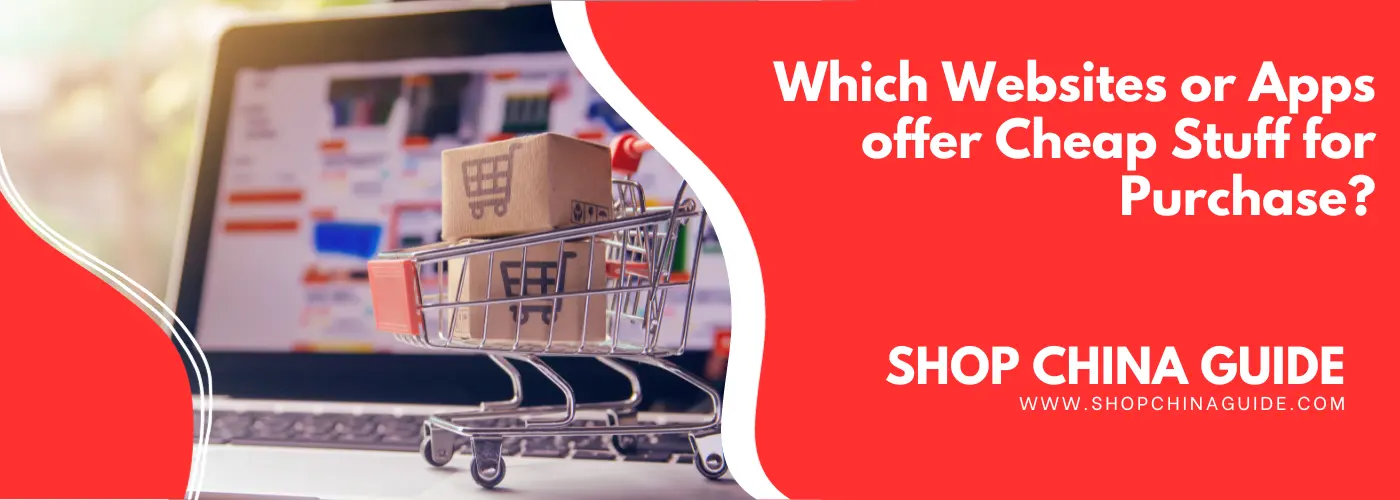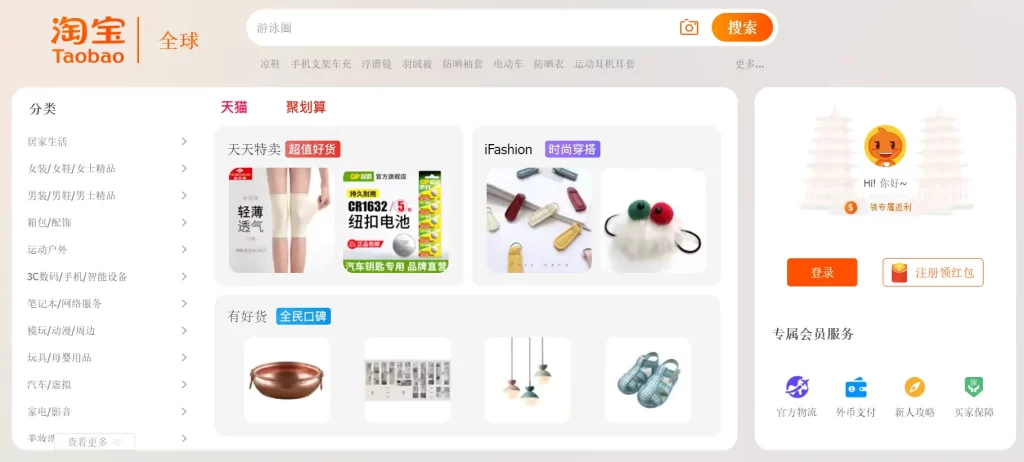In today’s global economy, widespread inflation and the escalating cost of goods significantly impact everyday people. The rising living expenses necessitate a shift towards frugality and a search for more affordable stuff. The internet, transcending national boundaries, opens up avenues for global purchasing. Notably, China stands out with its labor cost advantages and well-developed manufacturing sector, offering stuff that is not only cost-effective but also of improved quality due to enhanced e-commerce laws and manufacturing standards.
When looking for cheap websites to buy stuff on a global scale, Chinese online platforms are unrivaled in terms of variety and affordability. These platforms are designed to serve not just the domestic market but also to ship to most countries worldwide, offering global consumers easy access to budget-friendly stuff. Amidst the challenges of inflation and increased cost of living, Chinese online shopping sites emerge as ideal destinations for those seeking to buy cheap stuff without compromising on quality.
Exploring Cheap Websites to Buy Stuff in the USA
The U.S. e-commerce market boasts many renowned shopping platforms such as Amazon, eBay, and Walmart, offering a wide range of products and a convenient shopping experience. However, when we examine these platforms from a pricing perspective, we find that their products are often much more expensive than those on Chinese shopping websites or apps like Taobao and JD.com.
Even the U.S. version of Pinduoduo’s popular Temu app struggles to compete with the pricing on these Chinese domestic platforms. This highlights the competitive edge of Chinese e-commerce platforms in the global market, particularly in offering high-value-for-money products. For American consumers who are budget-conscious or seeking better value for money, this price difference may encourage them to turn to Chinese shopping platforms. This trend not only reflects the price sensitivity of American consumers but also illustrates the competitive landscape of global e-commerce, especially the advantages of Chinese platforms in offering cost-effective products.
The Cheapest Shopping Platforms in the World
1.TAOBAO
When it comes to the world’s cheapest online shopping platforms, Taobao is undoubtedly at the forefront. Established in 2003, Taobao, as one of China’s largest e-commerce websites, is part of the Alibaba group. It’s one of China’s earliest e-commerce platforms, operating in both C2C and B2C (Tmall) models. Taobao is renowned for its vast array of product categories and highly competitive prices. On Taobao, consumers can find everything from everyday essentials to luxury items, covering virtually all product categories. A large number of factories have their own stores on Taobao, offering prices so low they’re hard to imagine. To find the perfect deal, one needs to delve deeply and compare prices to find what they’re truly satisfied with.
Advantages of Taobao:
- Wide Range of Products: From everyday essentials to luxury items, covering almost every category of goods.
- Competitive Pricing: Direct factory-to-consumer approach reduces middleman costs, offering attractive prices.
- Numerous Sellers: Thousands of sellers provide a vast range of options for consumers.
- Flexible Shopping Modes: Combines C2C and B2C models to meet diverse consumer needs.
- Convenient Shopping Experience: User-friendly interface and simple purchasing process.
- Easy Price Comparison: Allows consumers to find the best deals by comparing products from different sellers.
- Image Search: Utilizing image search makes it easier for international consumers to accurately find the products they are looking for.
Disadvantages of Taobao:
- Language Barrier: Primarily caters to Chinese-speaking users, making it less accessible for international users who do not speak Chinese.
- Inconsistent Product Quality: Due to a wide range of sources, the quality of products can vary significantly.
- Higher Costs and Longer Times for International Shipping: International buyers face higher shipping costs and extended delivery times.
- Counterfeit Products: The presence of counterfeit or substandard goods in the marketplace.
- Challenges in After-Sales Service: International shopping can pose difficulties in after-sales support.
- Limited International Payment Options: Payment methods are mainly tailored for the Chinese market, which may not be convenient for overseas users.
Although Taobao primarily targets users in Mainland China, it has now opened several regional sites outside of Mainland China. It also supports payments via some international credit cards. Additionally, Taobao has introduced a consolidation shipping method specifically for overseas shoppers, allowing users outside Mainland China to shop on Taobao. With its pricing advantage, Taobao is fully equipped to attract overseas shoppers, who may be interested in exploring how to shop from the platform.
2. Tmall
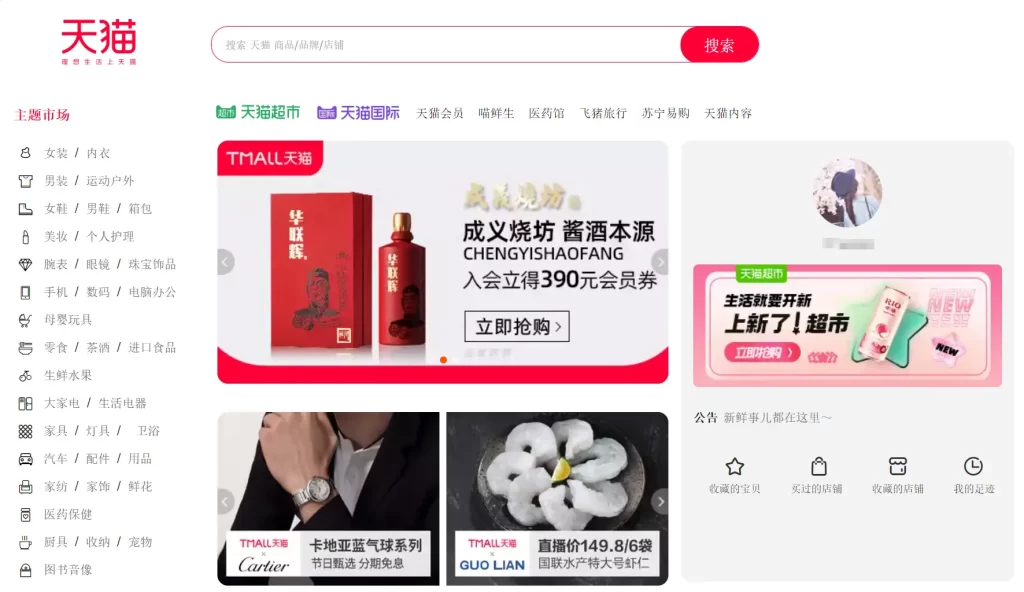
Tmall, essentially Taobao’s B2C arm, features stores set up by businesses or factories to sell their products. Although its inception was grounded in Taobao’s efforts to combat counterfeit goods and enhance the quality of products on the platform, thus meeting the shopping needs of diverse consumers, it’s the large number of factories in China’s coastal areas, specializing in clothing and small commodities, that underpin its success. Their ability to produce on a large scale and the advantages of lower labor costs reduce the cost per item. This enables them to open stores directly on Tmall and offer prices that are competitive compared to other platforms, sometimes even lower than C2C sellers on Taobao. Therefore, TAOTAO still recommends Tmall, emphasizing that buyers should learn how to compare and find the best deals.
Advantages of Tmall:
- Quality Assurance: Tmall’s sellers are usually regular businesses or factories, offering more reliable product quality.
- Brand Diversity: Features a variety of well-known brands, meeting different consumers’ brand preferences.
- Competitive Pricing: Similar to Taobao, some products may come directly from factories to consumers, reducing middle costs, thus offering very attractive prices.
- Authenticity Guarantee: Tmall conducts strict vetting of sellers’ qualifications and the authenticity of products, reducing the presence of counterfeit goods.
- After-sales Service: Compared to Taobao’s C2C model, Tmall shops generally offer more comprehensive after-sales services.
Disadvantages of Tmall:
- Relatively Higher Prices: Overall, prices on Tmall tend to be higher compared to Taobao.
- Limited Product Choices: Although there’s a variety of brands, each brand may have a limited range of products, not as extensive as Taobao.
- Lack of Personalization: Tmall’s products are more standardized, lacking the personalization and diversity found in Taobao’s C2C model.
- Barriers to International Shopping: For international buyers, language and shipping might still pose challenges.
Recommending Tmall adds another option for global shoppers. Some products are very competitively priced, and it’s important to learn to compare prices and search effectively. TAOTAO has even found instances where the price of the same product on Tmall is lower than on Taobao.
3. JD.com
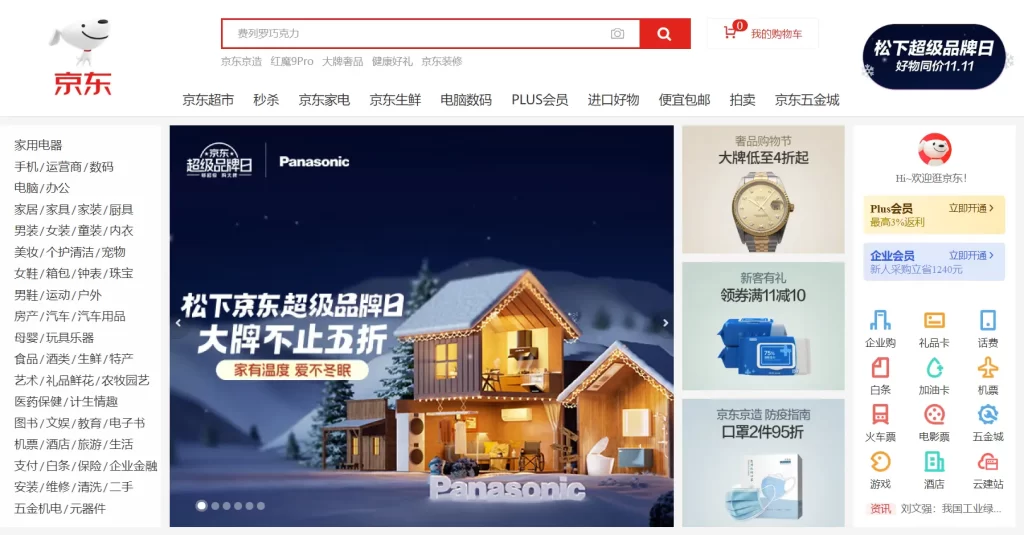
JD.com started as an e-commerce platform specializing in digital products and mobile phones, always focusing on genuine products and quality. Initially, it operated solely with JD’s own direct sales. Over time, the platform expanded to allow third-party sellers to open stores, gradually diversifying from exclusively digital products to a wide range of categories. To ensure timely delivery, JD later developed its own logistics network, now known as JD Logistics. Consumers in Mainland China often prioritize JD.com when purchasing new smartphones or other digital products. For those looking for cost-effective, branded products, JD.com is a viable option. Some digital products available in Mainland China offer significant advantages over those in the United States or other countries.
Advantages of JD.com:
- Authenticity Guarantee: Renowned for selling genuine and high-quality products, reducing the risk of counterfeits.
- Focus on Digital and Mobile Products: Especially strong in the digital and mobile phone sectors, offering the latest models and technologies.
- Self-built Logistics Network: Possesses an efficient logistics system, ensuring fast and punctual delivery within Mainland China.
- Diversified Product Categories: Expanded from solely digital products to include a wide range of categories like home appliances and daily necessities.
- Platform Development: Introduced third-party sellers, increasing product diversity.
Disadvantages of JD.com:
- Relatively Higher Prices: Compared to other e-commerce platforms, particularly Taobao and Tmall, prices might be higher.
- Language Barrier: Primarily caters to Chinese-speaking users.
- International Shopping Limitations: Targeted at consumers in Mainland China, not as accommodating to international buyers.
- Limited Product Choices: Although there’s a variety of categories, the range of products might be more limited compared to Taobao.
- Focus on Major Brands: More concentrated on well-known brands, lacking in niche or independent brand products.
4. 1688
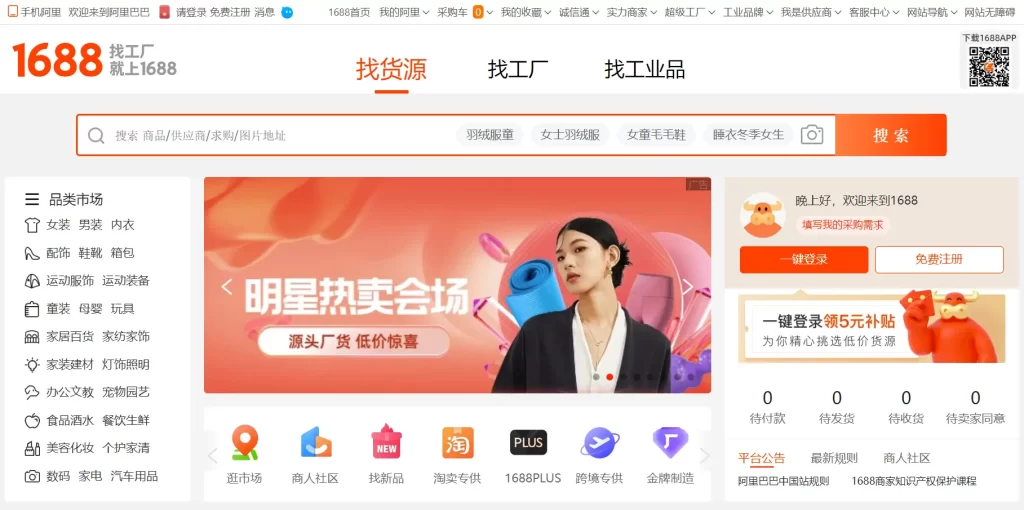
1688, also part of Alibaba Group like Taobao and Tmall, is an e-commerce platform primarily focused on wholesale business. However, this doesn’t diminish its appeal as a great choice for purchasing inexpensive goods. As individual consumers, the key is to identify shops that support shipping even for single-item purchases. You can also combine orders with friends or family to buy in bulk and benefit from wholesale prices. Additionally, since it’s a wholesale platform, you have the opportunity to negotiate prices with sellers. It’s important to communicate with sellers using the in-platform chat tool before placing an order.
Advantages of 1688:
- Focus on Wholesale: Primarily caters to the wholesale market, offering a vast range of products for bulk purchase.
- Competitive Pricing: As a wholesale platform, it generally offers lower prices with significant cost advantages.
- Diverse Product Range: Provides a wide variety of products, from daily necessities to industrial goods.
- Price Negotiation: Buyers can negotiate prices with sellers for better deals on wholesale items.
- Supports Small Quantity Wholesale: Some shops allow small quantity wholesale, enabling individual consumers to enjoy wholesale prices.
Disadvantages of 1688:
- Targeted at Business Users: Primarily designed for the B2B market, not as user-friendly for ordinary consumers.
- Language and Logistics Barriers: Mainly serves the Chinese market, posing language and logistics challenges for international buyers.
- Complex Purchase Process: The wholesale buying process is more intricate compared to retail, requiring more communication with sellers.
- Inconsistent Product Quality: Given its focus on the wholesale market, product quality can vary, necessitating careful selection by buyers.
- Minimum Order Quantity Restrictions: Although some shops support small quantity wholesale, most have minimum order quantity requirements.
The variety of products on 1688 even surpasses the previous three platforms, with everything from industrial supplies to raw materials needed for factory production available. It’s a platform where you can find just about anything. If you’re an individual consumer, it’s worth browsing through 1688 – you might just discover products that are perfect for your needs.
5. Aliexpress
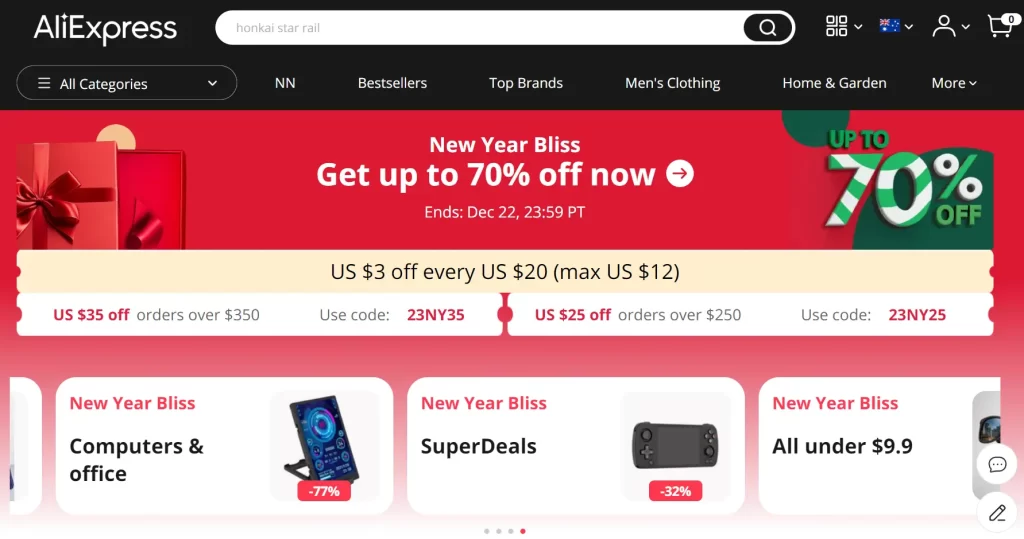
AliExpress, as the name suggests, is also under the Alibaba umbrella, but it’s unique compared to the other platforms because it specifically targets overseas consumers. Interestingly, it’s less user-friendly for customers in Mainland China in terms of payment options. Many sellers on AliExpress are also present on Taobao, Tmall, or even 1688, offering the same products at competitive prices. Consequently, a significant portion of the products you find on AliExpress are sourced from Taobao or 1688. Additionally, the payment methods and the sellers’ support for international logistics on AliExpress provide a more favorable experience for overseas shoppers.
Advantages of AliExpress:
- International Focus: Specifically designed for overseas consumers, accessible to global customers.
- Diverse Product Range: Offers a wide variety of products, including those from Taobao, Tmall, and 1688.
- Multilingual Customer Service: Primarily serving international customers, customer service is typically available in English and even Russian.
- Competitive Pricing: Features prices similar to those on Chinese domestic platforms.
- Convenient Payment Options: Provides user-friendly payment options for international customers.
- Robust Logistics Support: Supports international shipping, facilitating global purchases.
Disadvantages of AliExpress:
- Variable Product Quality: Inconsistent product quality, with some items potentially not meeting expected standards.
- Longer Shipping Times: International shipping often opts for more affordable courier services, but shipping times cannot compete with those of domestic platforms in the USA.
- Potential Import Taxes and Fees: Depending on the regulations of the buyer’s country, additional import duties and taxes may be incurred.
If you’re not someone who enjoys research and challenging yourself, then AliExpress is a great place to find inexpensive items, as it’s specifically aimed at selling China’s affordable products to regions outside of mainland China. Additionally, it supports multiple languages and various currencies.
6. Pinduoduo
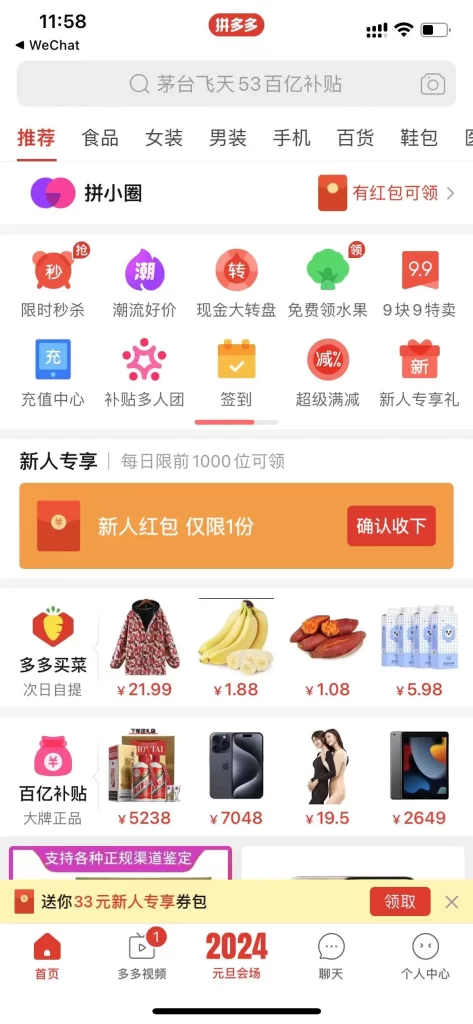
Pinduoduo, an emerging star in China’s e-commerce sector, is a third-party social commerce platform focusing on C2M (Consumer-to-Manufacturer) group buying. Established in September 2015, it allows users to initiate group purchases with friends, family, and neighbors, offering quality goods at lower prices. Despite its relatively recent inception, by December 2023, Pinduoduo’s total market value has reached $1989.13 billion, surpassing Alibaba. Even for Chinese consumers accustomed to low prices, Pinduoduo’s group buying model is more appealing than Taobao, offering even lower prices.
Advantages of Pinduoduo:
- Group Buying Model: Users can enjoy lower prices by forming groups with friends and family for purchases.
- Price Advantage: Offers lower prices for products compared to other e-commerce platforms.
- Wide Range of Products: Covers a broad range of categories to meet various consumer needs.
- Social Commerce Features: Integrates social networking functions to enhance the shopping experience and interaction.
- Rapid Growth: Quickly grown in market value, becoming a significant force in China’s e-commerce industry.
Disadvantages of Pinduoduo:
- Quality Issues: Some products may have inconsistent quality.
- Language Barrier: Primarily caters to Chinese-speaking users.
- Counterfeit and Inferior Products: The platform might contain some fake or inferior products not thoroughly vetted.
- Complexity in Returns and Exchanges: The group buying model can make processing returns and exchanges more complicated than traditional e-commerce.
- User Experience Challenges: Some users might find it inconvenient due to insufficient product search and filtering functionalities.
- Over-Reliance on Low Prices: The low-price strategy could affect the brand image and struggle to attract premium brands and consumers.
- Only available on the app, not on the web.
For overseas users, shopping on Pinduoduo can indeed be challenging, but the platform’s attractive pricing is a significant draw. If you’re willing to explore and learn, you can understand how to place orders on Pinduoduo and have them shipped globally.
7. Temu

Mentioning Pinduoduo brings us to its cross-border e-commerce platform, Temu. Launched on September 1, 2022, most people might have seen Temu’s extensive advertising and numerous promotional activities, with surprisingly low prices. Temu is now officially available in the United States, Canada, New Zealand, the United Kingdom, Australia, and Malaysia.
To enhance logistics efficiency, Temu has set up multiple warehouses in China, where sellers are required to deliver their goods in advance to Temu-designated warehouses. This arrangement allows Temu to centrally manage and uniformly process goods, thereby improving the efficiency and accuracy of logistics.
Advantages of TEMU:
- Wide Coverage: Services offered in the USA, Canada, New Zealand, the UK, Australia, and Malaysia.
- Competitive Pricing: Products are significantly cheaper compared to other platforms.
- Centralized Warehousing: Multiple warehouses in China for centralized management and uniform handling of goods, enhancing logistical efficiency.
- Diverse Product Range: Offers a variety of products, similar to its parent platform, Pinduoduo.
- Convenience in Cross-Border Shopping: Simplifies the process for international customers to purchase products from China.
- Promotional Activities: Regular discounts and promotional activities to attract a wide customer base.
Disadvantages of TEMU:
- Quality Issues: Similar to its parent company Pinduoduo, some products may have inconsistent quality.
As a representative of the new wave of e-commerce platforms, favored by capital investment, TEMU has quickly gained popularity among Western consumers from its launch. Unlike most e-commerce platforms primarily targeting consumers in mainland China, TEMU focuses on overseas customers, offering a range of cost-effective products from China. Moreover, compared to AliExpress, TEMU’s logistic speed is more attractive. If you’re looking for an online platform to buy affordable items, TEMU is a great choice.
8. SHEIN

SHEIN, a company based in China, is extremely popular in Europe and America but is not very well-known in mainland China. Since its inception, SHEIN has been focused on the Western market, specializing mainly in clothing, particularly women’s fashion and fast fashion items. Over the past decade, SHEIN has evolved into a comprehensive shopping platform, with its app now showcasing a wide range of products from clothing to electronics to home goods. The pricing is moderate and offers a significant advantage compared to Western platforms like Amazon or Walmart. Typically, the shipping time is between 8 to 12 days.
SHEIN’s Advantages:
- Competitive Pricing: SHEIN offers highly competitive prices.
- Product Diversity: SHEIN provides a wide range of product categories.
- Fashion Focus: SHEIN primarily features the latest women’s fashion trends and fast fashion, catering to the needs of young consumers.
- Relatively Fast Logistics: Generally, shipping times are between 8-12 days, which is relatively fast for cross-border shopping.
SHEIN’s Disadvantages:
- Inconsistent Quality: Some products may have varying levels of quality.
- Sustainability and Environmental Concerns: The fast fashion model may raise concerns regarding environmental sustainability.
9. Alibaba
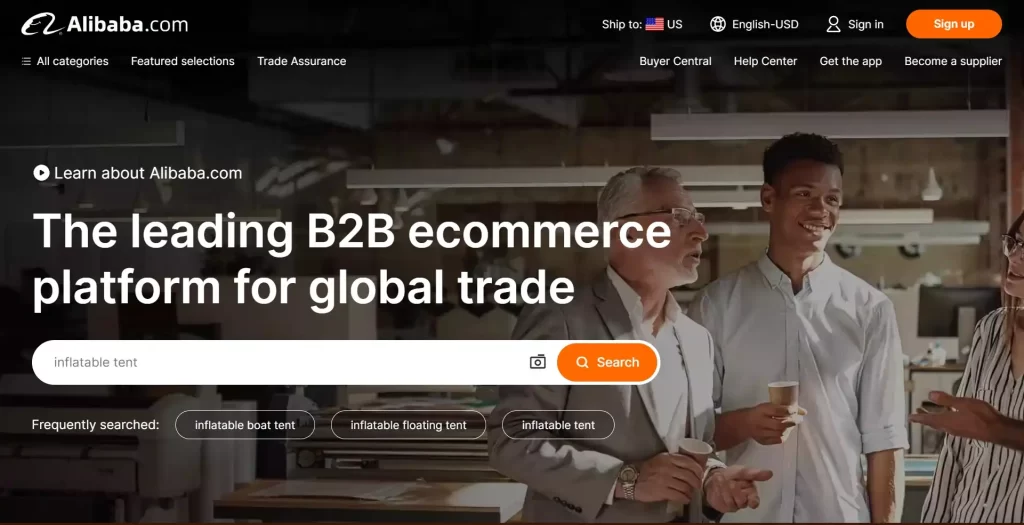
Alibaba is essentially the international version of 1688 and the wholesale version of AliExpress, targeting the overseas wholesale market. When shopping on Alibaba, it’s essential to note that some sellers may require a minimum order quantity, though you can also find stores that allow ordering just one item. The majority of sellers here are factories or businesses that set up shops directly on Alibaba, serving consumers without intermediaries or commissions, offering very competitive prices. However, it’s crucial to compare prices and research product quality, as there are often varying buyer reviews, some of which may not be favorable.
Advantages of Alibaba
- Vast Product Range: Alibaba offers an extensive collection of products in various categories, catering to virtually every need.
- Direct From Manufacturers: Many sellers are manufacturers, providing goods at factory prices, which can be significantly lower.
- Customization Options: Many suppliers offer customization for bulk orders, which is ideal for businesses looking to brand their products.
- Global Reach: Alibaba connects buyers from all over the world with suppliers, making it a global marketplace.
- Trade Assurance: A service offered by Alibaba to safeguard buyers by ensuring orders are fulfilled as promised.
- Wholesale Pricing: As it’s geared towards B2B transactions, prices can be much lower, especially when ordering in bulk.
Disadvantages of Alibaba
- Minimum Order Quantities: Some suppliers require large minimum orders, which can be a barrier for small businesses or individual buyers.
- Quality Variability: Product quality can vary significantly between suppliers, and determining quality from online listings can be challenging.
- Shipping Costs: For international buyers, shipping can be expensive and time-consuming, sometimes negating the cost benefits.
- Language and Communication Barriers: Not all suppliers are fluent in English or other languages, which can lead to misunderstandings.
- Risk of Fraud: While Alibaba has measures in place to reduce fraud, there’s still a risk when dealing with unknown suppliers.
- Complexity for New Users: Navigating the platform, understanding trade terms, and managing international logistics can be overwhelming for new users.
10. DHgate
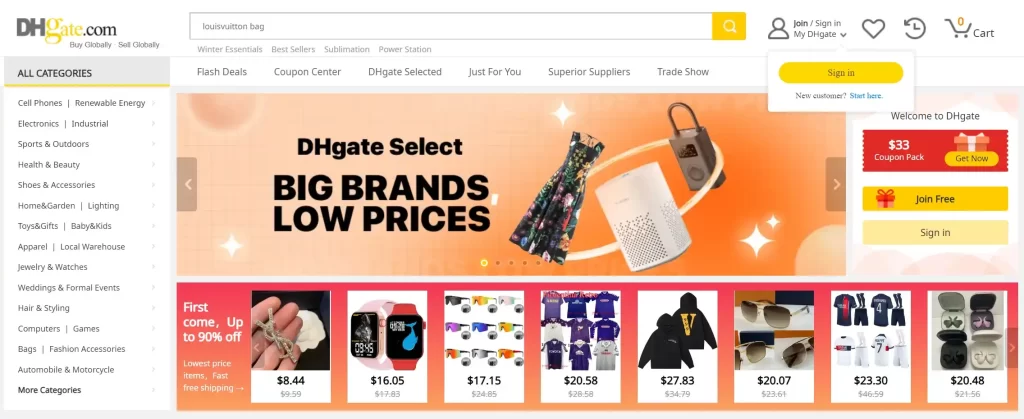
DHgate, which may not be well-known to most people in Mainland China, was established around the same time as Alibaba and Taobao. However, it has been targeting overseas buyers since its inception. Operating primarily on a B2B model, it’s now the largest Chinese cross-border B2B e-commerce platform in the U.S. market, offering a wide variety of goods. Like Alibaba, it requires you to discern quality and compare prices, but it’s equally possible to find items that are both low in price and high in quality.
Advantages of DHgate:
- Wide Product Range: DHgate offers a vast array of products across various categories, similar to other large e-commerce platforms.
- Competitive Pricing: Many items are available at lower prices, especially when buying in bulk, making it attractive for resellers and small businesses.
- Direct from Manufacturers: Many sellers on DHgate are manufacturers, offering direct access to products and potentially lower prices.
- Global Shipping: DHgate ships to many countries worldwide, making it accessible for international buyers.
- Buyer Protection: DHgate provides a buyer protection policy that includes a refund if the item isn’t received or if it isn’t as described.
- Multiple Payment Options: The platform offers various payment methods to cater to global buyers.
Disadvantages of DHgate:
- Variable Quality: The quality of products can vary significantly between sellers, and some may not meet expectations.
- Counterfeit Goods: There’s a risk of encountering counterfeit items, especially with branded products.
- Long Shipping Times: Shipping can take a long time, especially with standard methods, which can be problematic for those needing items quickly.
- Complex Dispute Resolution: While there is buyer protection, resolving disputes can be a complex and time-consuming process.
- Language Barrier: Not all sellers are proficient in English, which can lead to communication challenges.
- Inconsistent Seller Reliability: Seller reliability can vary, and some may have poor customer service or unreliable shipping practices.
Conclusion
In summary, when seeking the cheapest online shopping platforms globally, China remains a top option. While many Chinese e-commerce platforms may not be as friendly to consumers outside mainland China, there are still ways to make purchases. If you don’t speak Chinese, you can use translation tools. If you find it troublesome, you can use an agent for your shopping and have the items shipped to your doorstep. If price is your primary consideration, I suggest trying out the platforms I’ve recommended. They may offer you a pleasant surprise.

